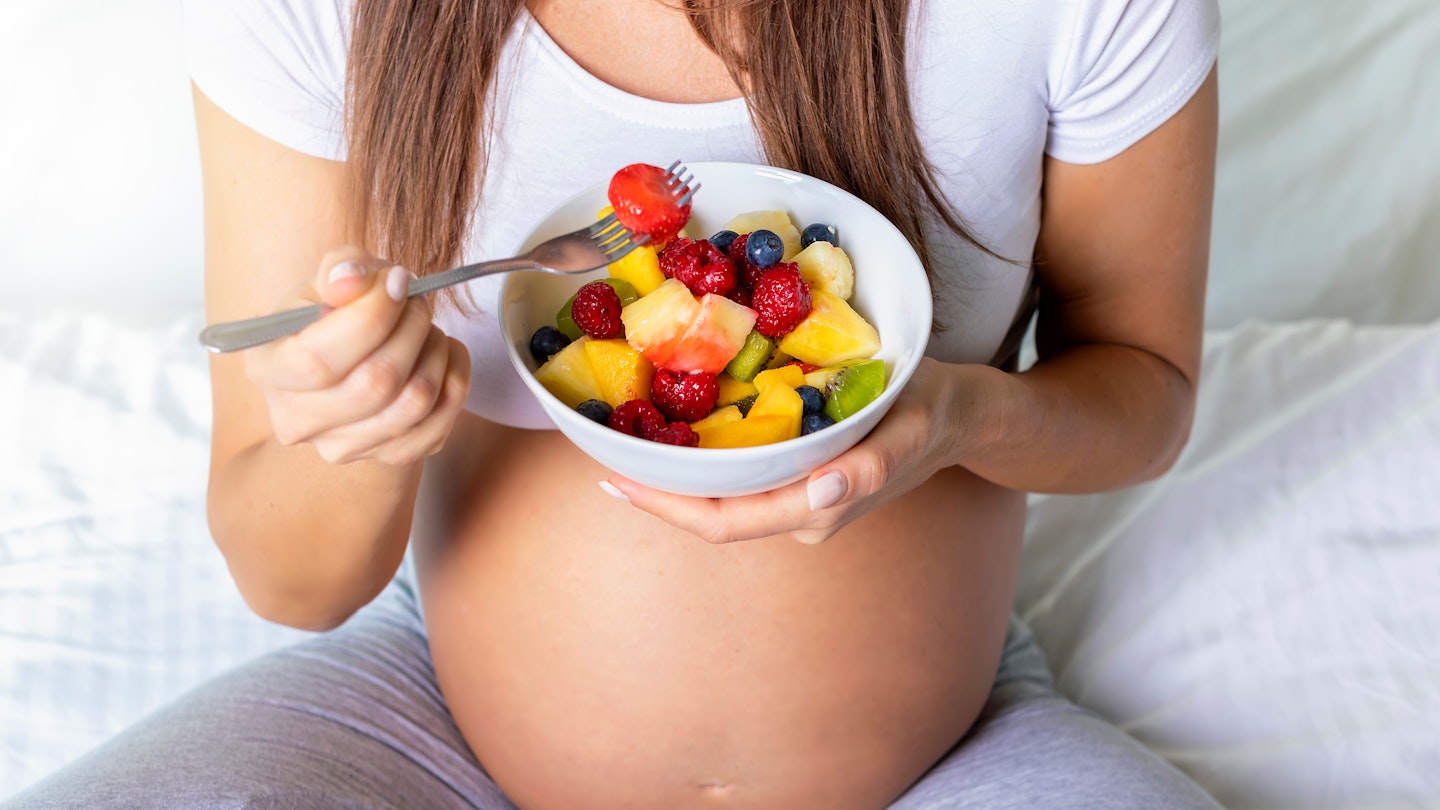Now you're eating for two, it's important to get all the nutritients you and your baby need throughout each stage of your pregnancy and beyond by eating the best foods for your pregnancy. So, instead of lurching from saintly food habits to craving a chocolate binge, you'll want to tailor your diet to each stage of your nine months. Say hello to your new eating rules...
Read on to find out more about the foods below and what stage of pregnancy it's best to eat them:
-
Spinach
-
Meat
-
Oily fish
-
Carrots
-
Milk
-
Mushrooms
-
Kale
-
Brazil nuts
-
Sesame seeds
-
Pumpkin
Certain nutrients are important during pregnancy to ensure everything ticks along nicely. Your body is working hard all the time which is why you probably feel pretty fed up and exhausted. It is possible to take vitamins or nutrient supplements during pregnancy but it is important to check with a doctor or pharmacist which is safe.
Research suggests half of British women are confused by the food advice given during pregnancy. We’re supposed to eat healthily, but what and when? The latest approach is to tailor your diet to support your baby’s development at each stage of pregnancy. And, as it’s what your body needs, it suits your cravings, too. Bring it on.
Pregnancy is split into three stages: the first, second and third trimester. If you've just taken a pregnancy test (read: if you only got a faint line on the pregnancy test), have been exhibiting some of the early signs of pregnancy and have found out you are pregnant - welcome to the first trimester of pregnancy!
During the first trimester, you are likely to experience everything from morning sickness to tender breasts, fatigue, general pregnancy pain, heartburn and indigestion - sounds fun right? You'll want to make sure your diet supports you through this tricky stage, as well as eating to support your immune system to fend off any pregnancy coughs or colds you might pick up.
In order to make these first thirteen weeks as bearable as possible, it is a good idea to stick to healthy diet and make sure you read up on what food and drink you need to avoid when you're expecting. It is important you get all the nutrients you need when growing a baby so we have rounded up the best food to eat during this important stage of pregnancy.
Stage 1: The early weeks
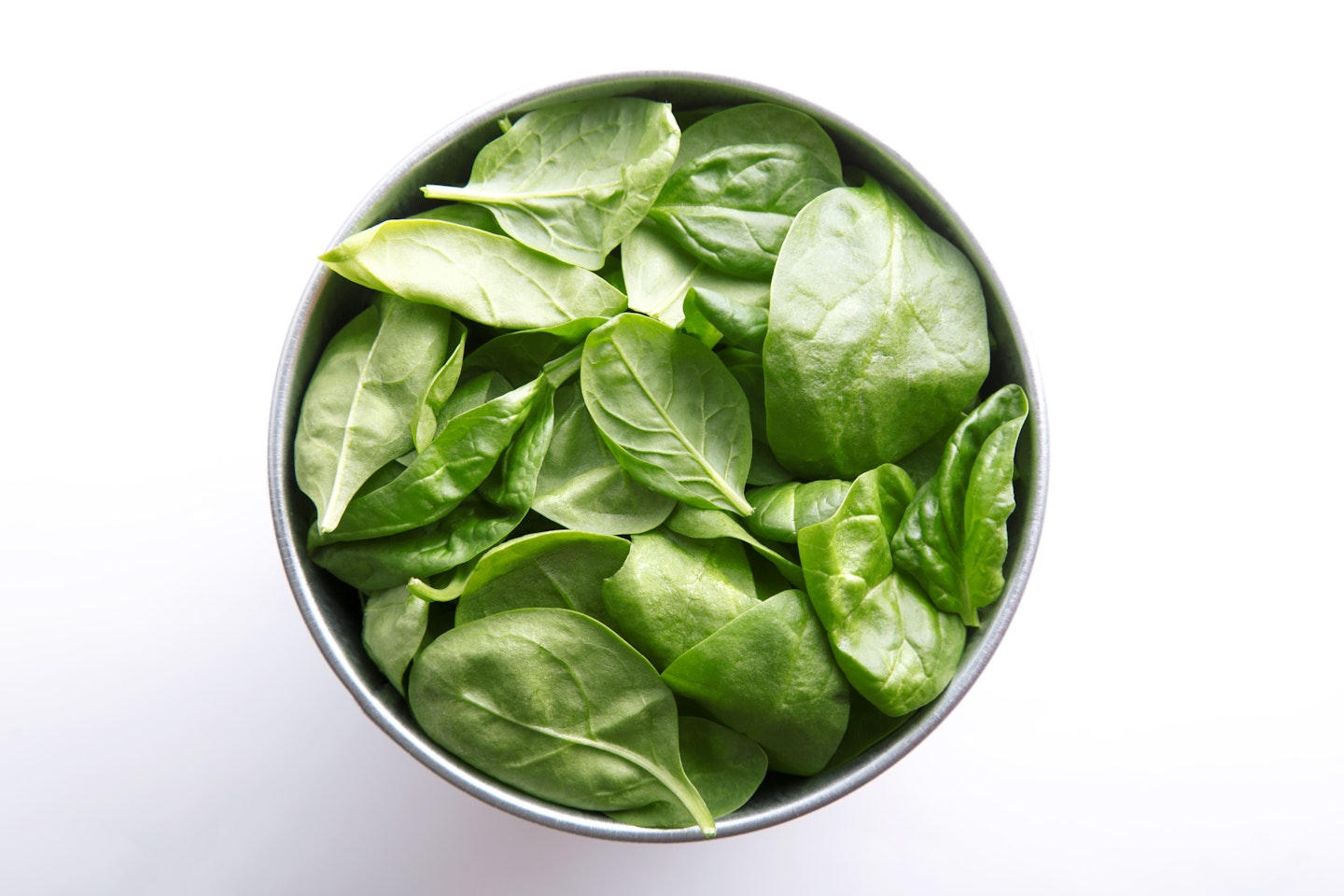
Before you conceive and during the first month of pregnancy, you’re laying down nutritional reserves to benefit your baby. So, what should you stockpile?
Greens are a great place to start, particularly broccoli and spinach, as these are rich in [folic acid]{href='https://www.motherandbaby.com/pregnancy/health-and-wellness/best-foods-to-eat-at-every-stage-of-pregnancy-and-post-birth/' }. ‘This provides the building blocks needed to construct every cell in your baby’s body,’ says nutritionist Saidee Bailey. Folic acid also helps that crucial early spinal development. And that’s not all. Greens could help ease early morning sickness, thanks to their high magnesium content. ‘A recent survey found up to 90% of women with severe morning sickness were deficient in the mineral,’ says Saidee.
Stage 2: Weeks 4 - 12
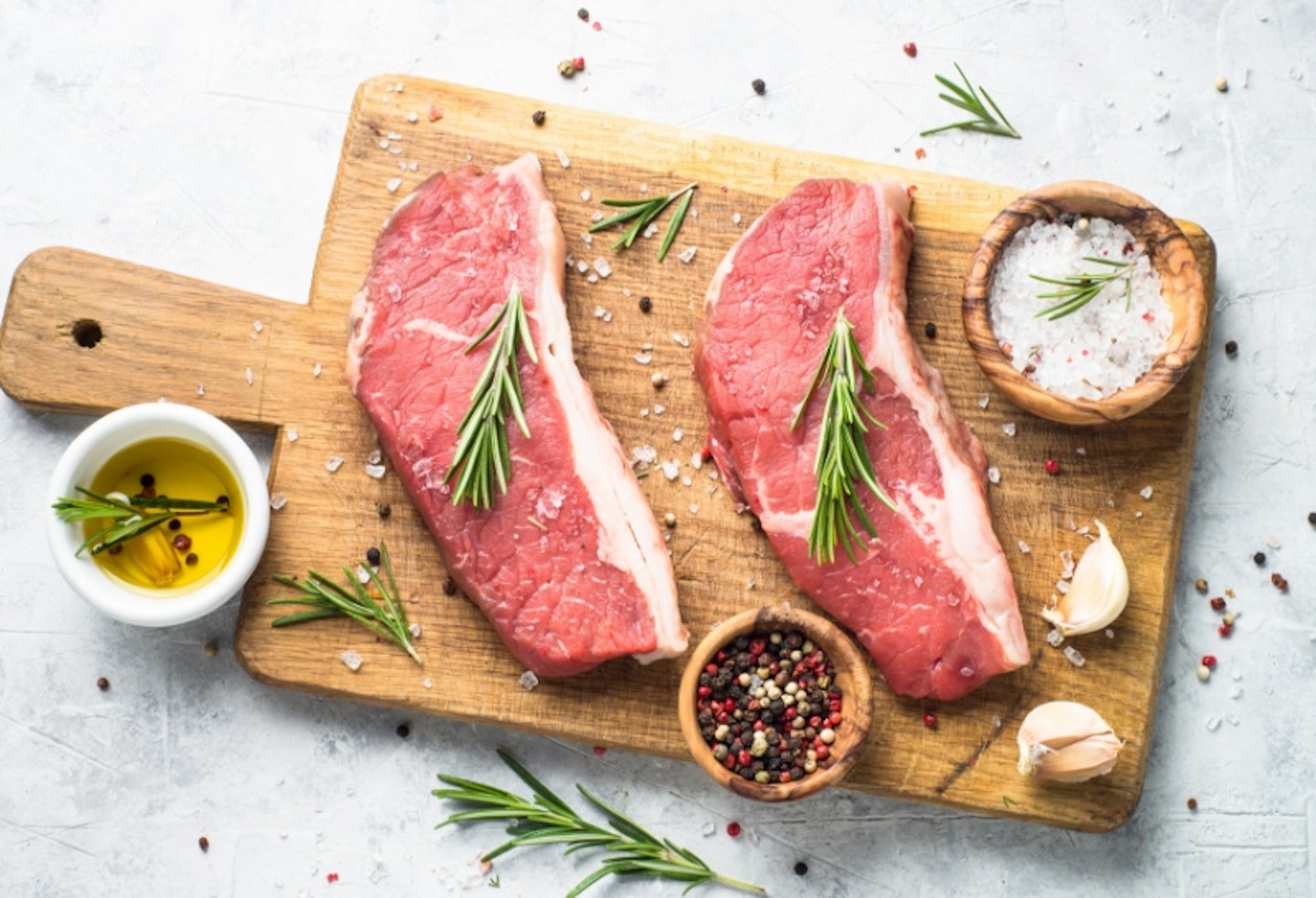
Your baby’s developing fast. At around week six, his heart starts to beat and his red blood cells are forming, so boost your own iron intake. There are two types – heme iron (found in meat) and non-heme iron (in leafy greens). They’re equally beneficial, but heme is utilised more easily than its vegetarian cousin. If you don’t eat meat, drink orange juice with your meals to help with absorption.
Greens could help ease early morning sickness, thanks to their high magnesium content
By week 12, your baby’s brain is developing faster than any other part of his body, so load up on the ‘good’ fat DHA. The richest source is oily fish – think sardines and mackerel. Pregnant women should stick to two portions of oily fish per week, so you might want to top up your levels. ‘DHA is just as easily absorbed in supplement form. Look for a prenatal vitamin containing EPA or DHA,’ says nutritionist Lowri Turner. Try Biocare Mega EPA {href='http://revital.co.uk' target='_blank' rel='noopener'}).
18 superfoods to eat during the first trimester:
foods to eat during the first trimester
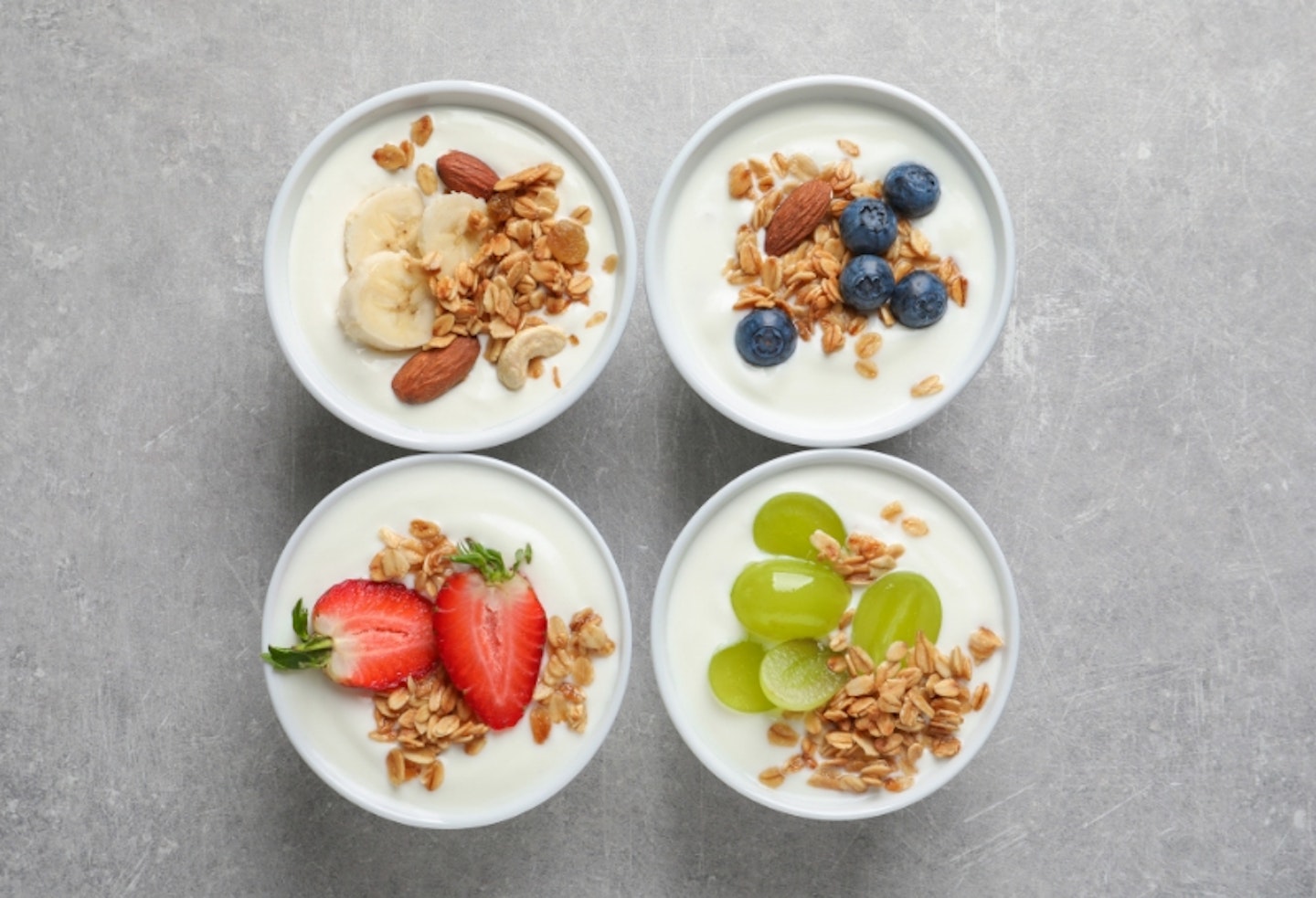 1 of 18
1 of 181) Yoghurt
If hot meals are offputting, yoghurt is a great soothing option to fill you up. You can have it with fruit or try grated apple as that is thought to be good for settling an upset stomach.
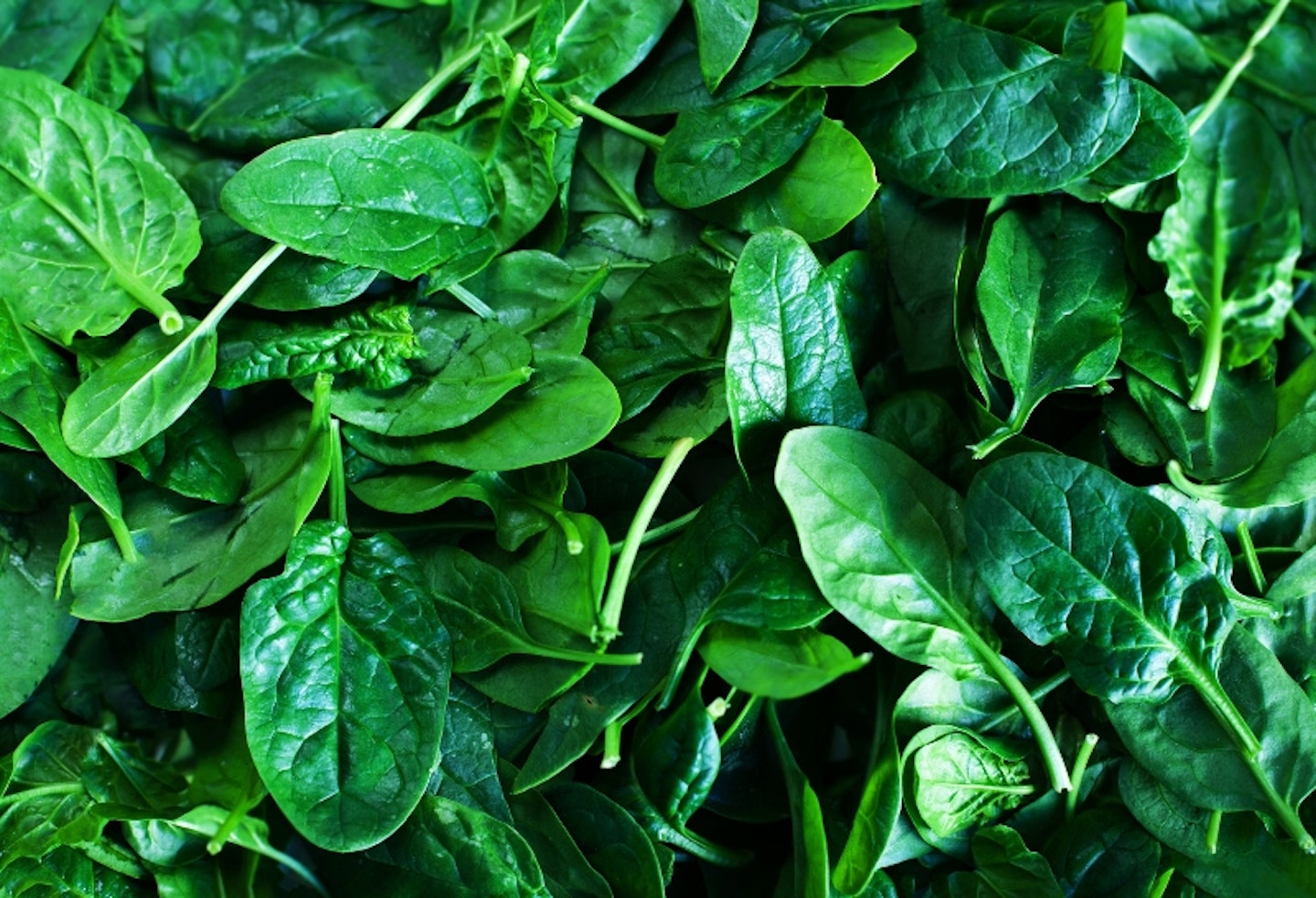 2 of 18
2 of 182) Spinach
Spinach is a great dark leafy green that is full of vitamins and nutrients. According to the World's Healthiest Foods it has a very high concentration of vitamin K, vitamin A, manganese, folic acid, magnesium and iron! You can put it in lots of dishes and let it wilt or have it blizted up in a smoothie.
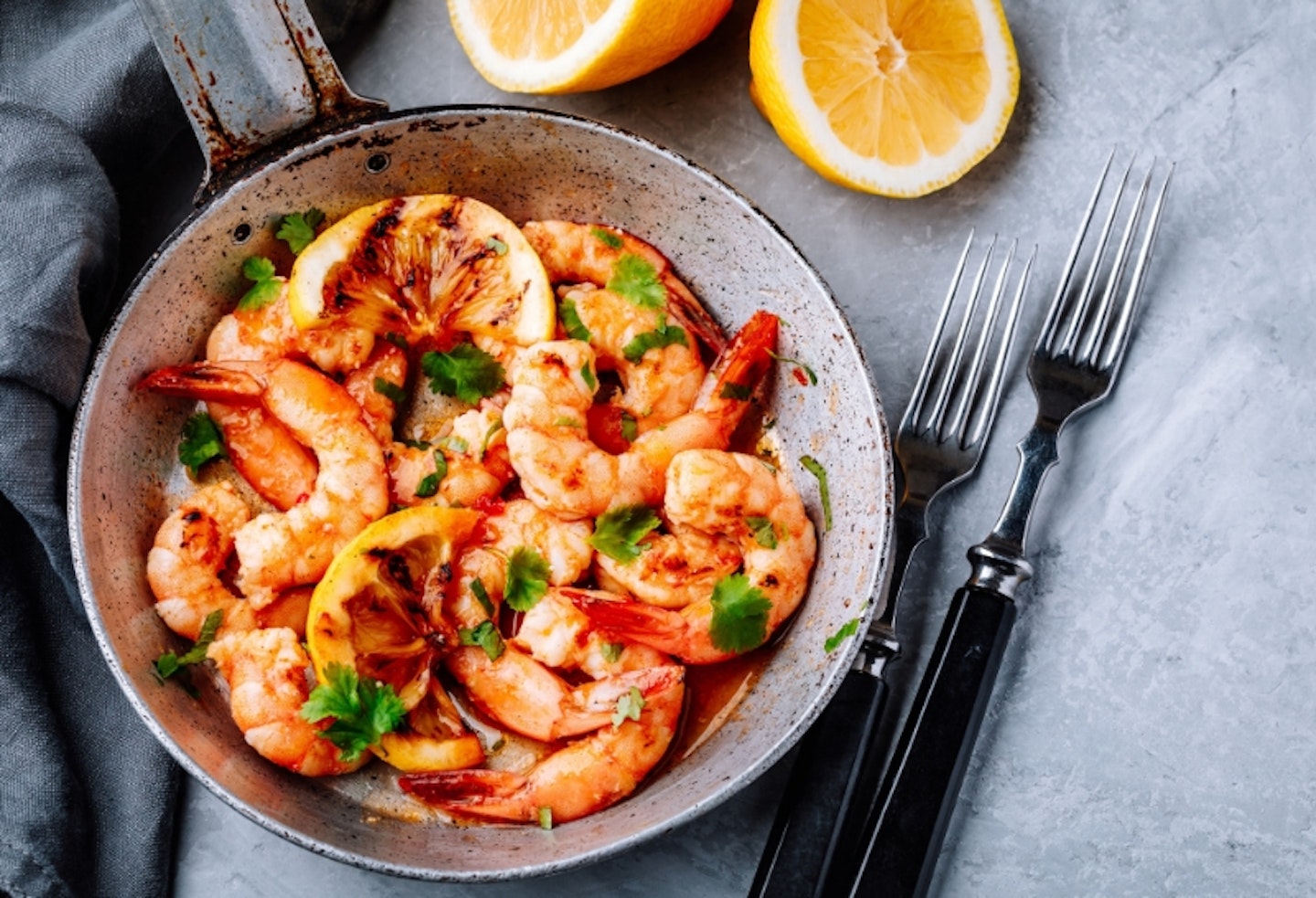 3 of 18
3 of 183) Seafood
Seafood and shellfish as long as it is cooked is great during pregnancy. It contains iron and a good ammount of protein.
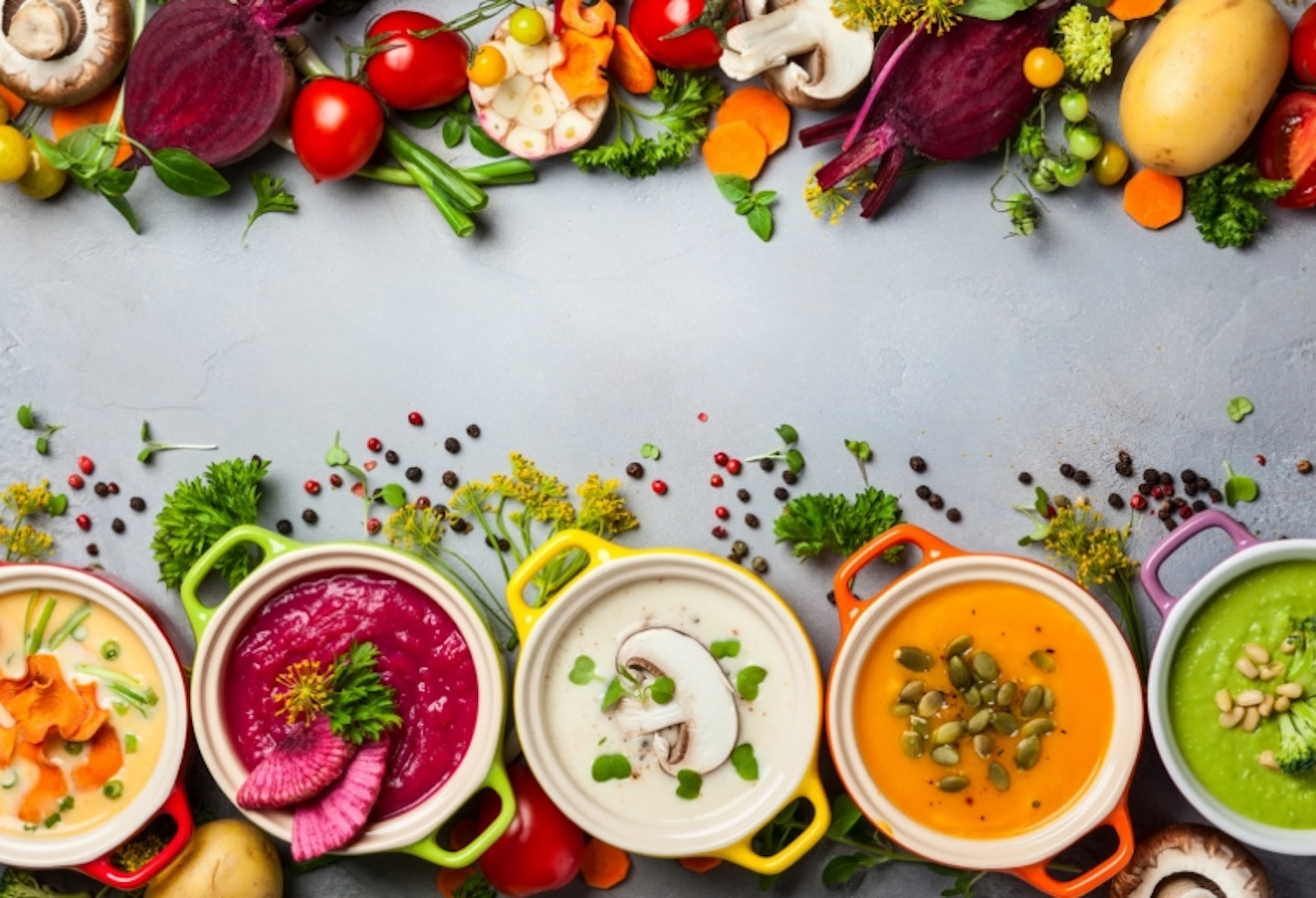 4 of 18
4 of 184) Vegetable soups
Soup is a good way to get your veggies in. Go for realtively bland, comforting soups as they will be easy to digest too!
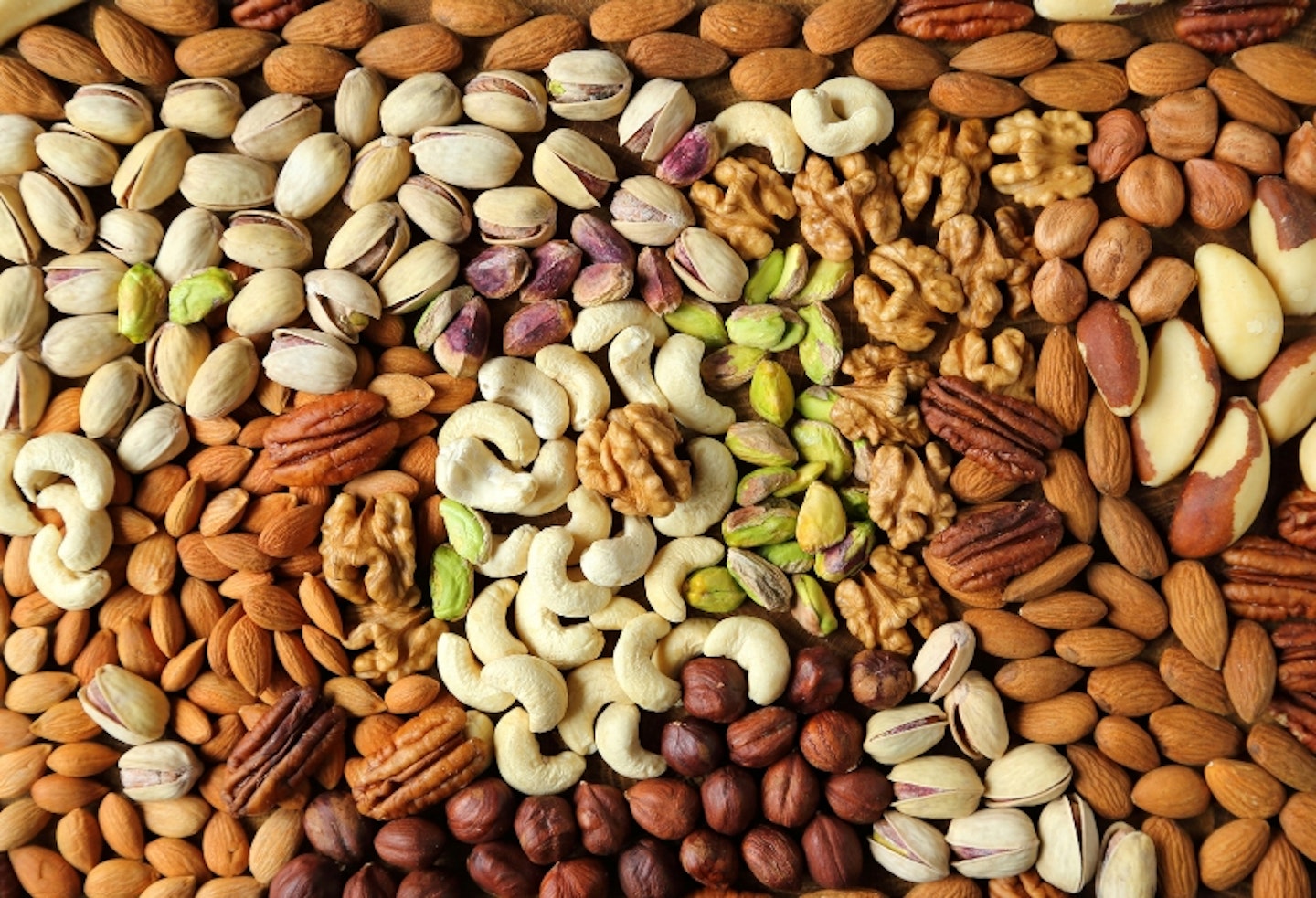 5 of 18
5 of 185) Nuts
Nuts are always a good healthy snack, especially if you are trying to eat small regular meals. They contain healthy fats and choline.
 6 of 18
6 of 186) Red meat
Red meat is high in protein, iron and vitamin B12.
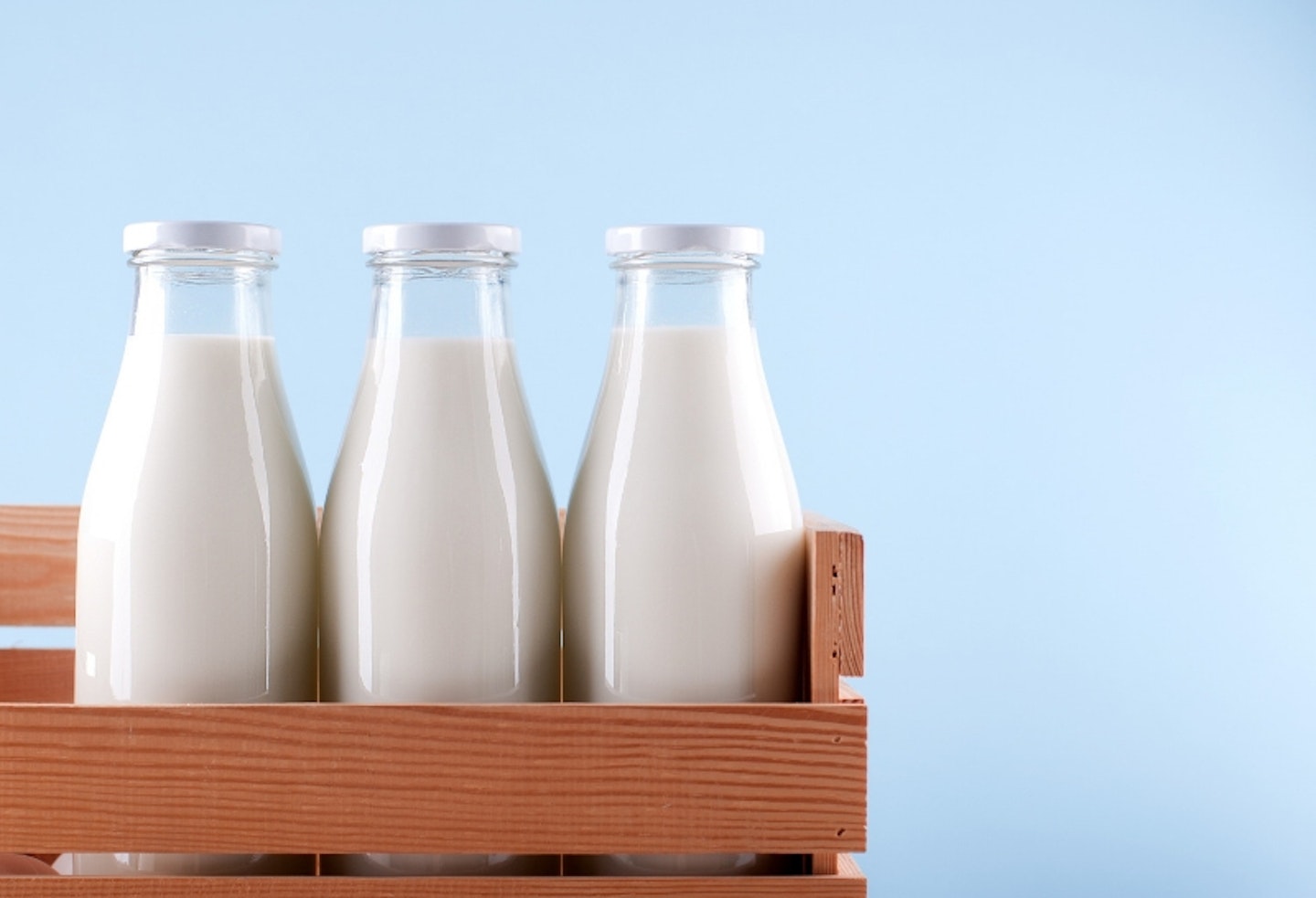 7 of 18
7 of 187) Milk
Milk contains protein, good fats, choline and vitamin B12. You can always swap to nut milks if you're vegan!
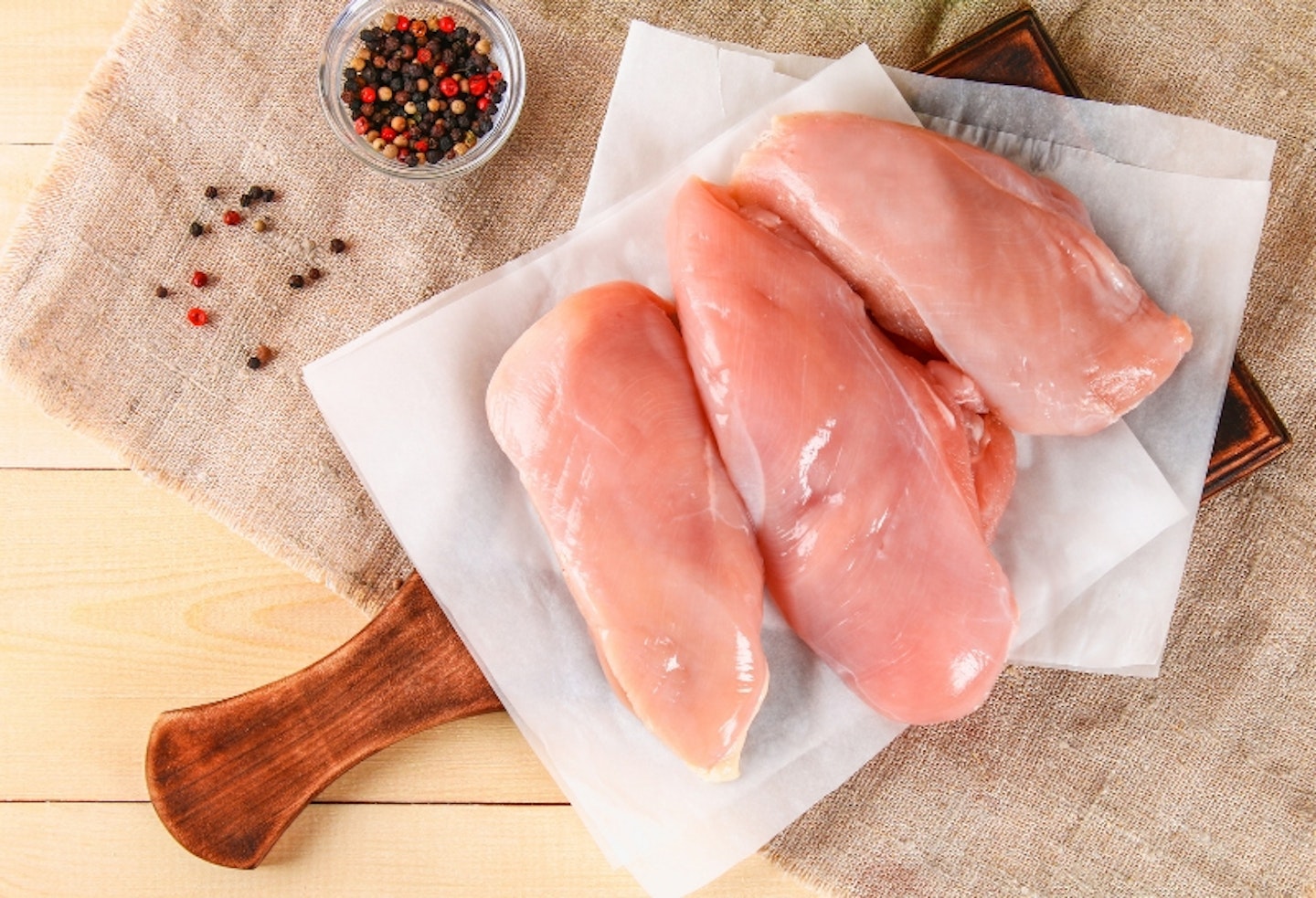 8 of 18
8 of 188) Poultry
Poultry contains protein, vitamin B6, vitamin B12 and choline. Chicken is a good, relatively bland source of protein that you can add flavour too easily which is also low fat.
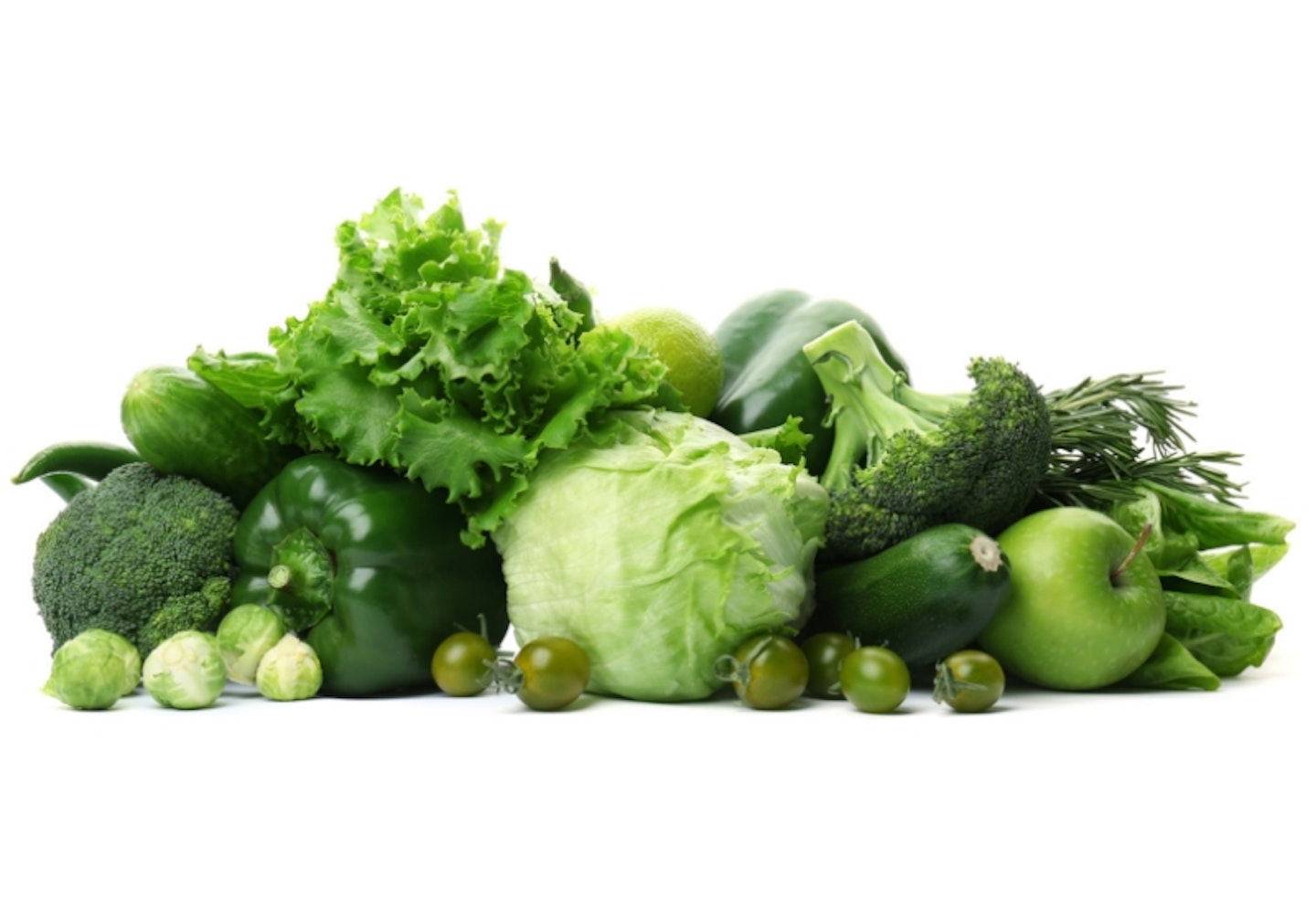 9 of 18
9 of 189) Green vegetables
Whether you are pregnant, in the first, second or third trimester, green vegetables are always going to be good for you. They are packed full of vitamins and nutrients and are a good way to fill you up while being low in calories and fat. They should also help with digestion due to their high fibre content.
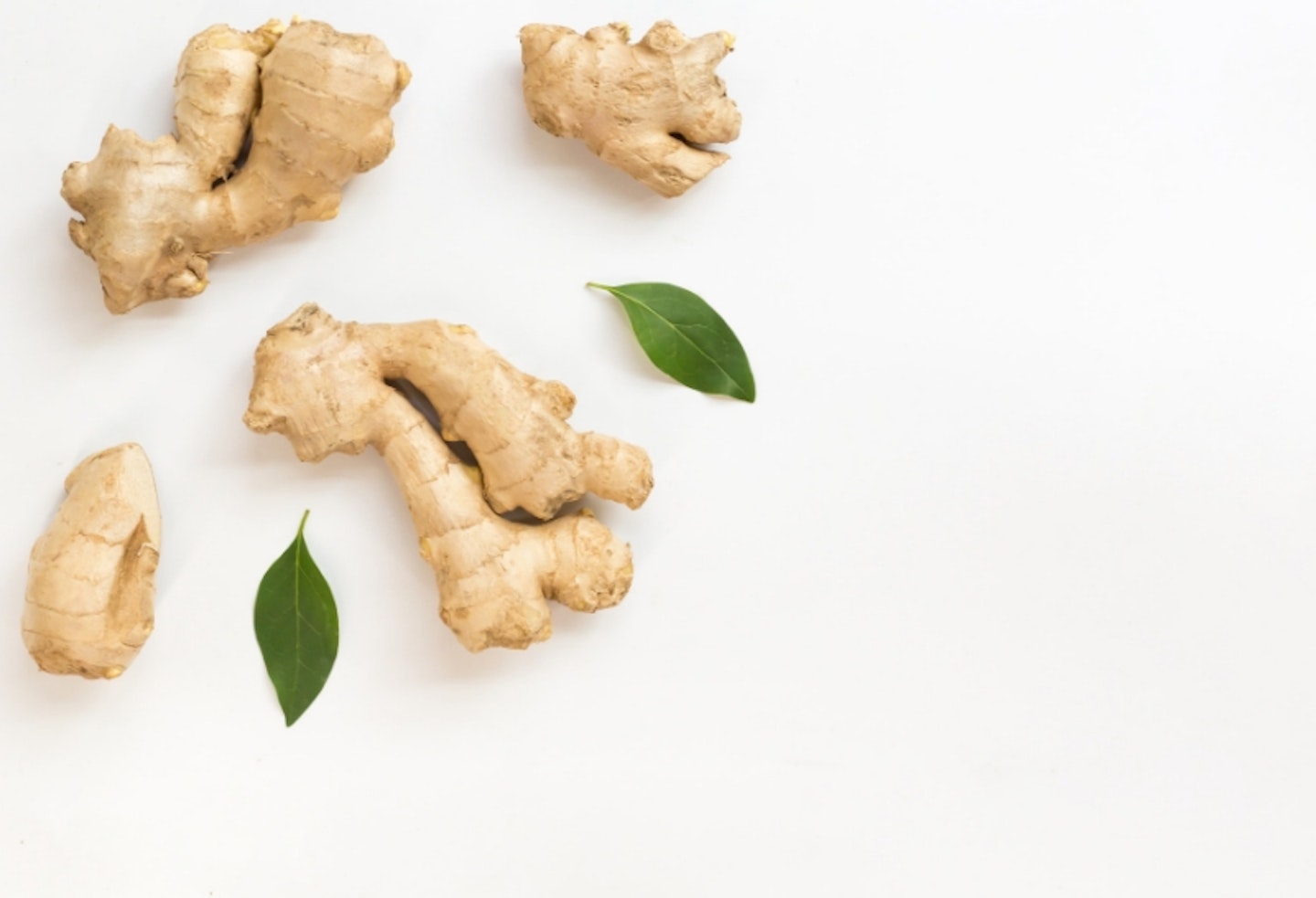 10 of 18
10 of 1810) Ginger
Ginger has almost unbelievable powers of healing. Pop some in a stir fry or have it in ginger tea.
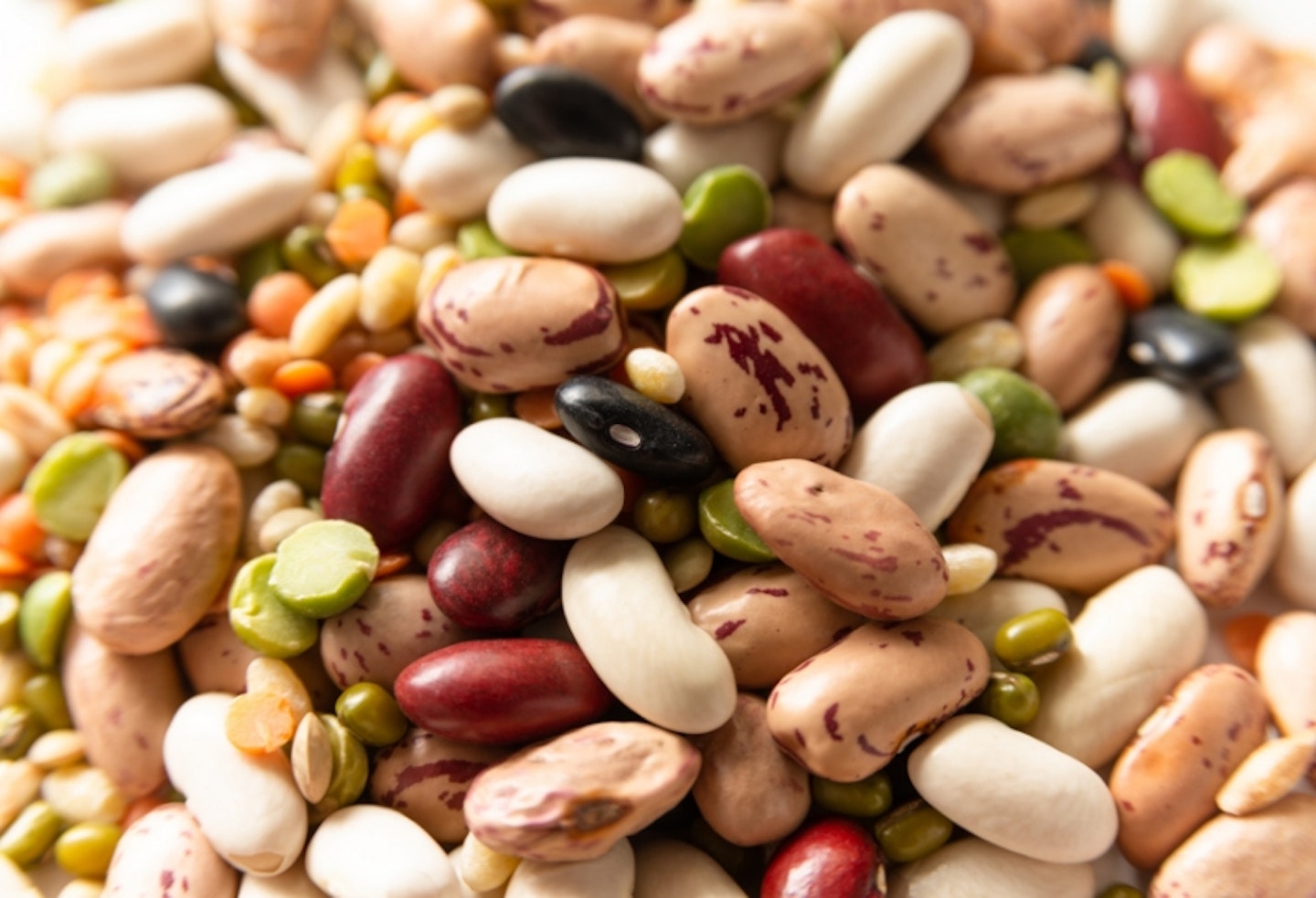 11 of 18
11 of 1811) Legumes
The food group legumes includes chickpeas, lentils, beans and pulses. Legumes contain loads of goodness: B vitamins, iron, folic acid, magnesium, zinc, potassium and phosphorus.
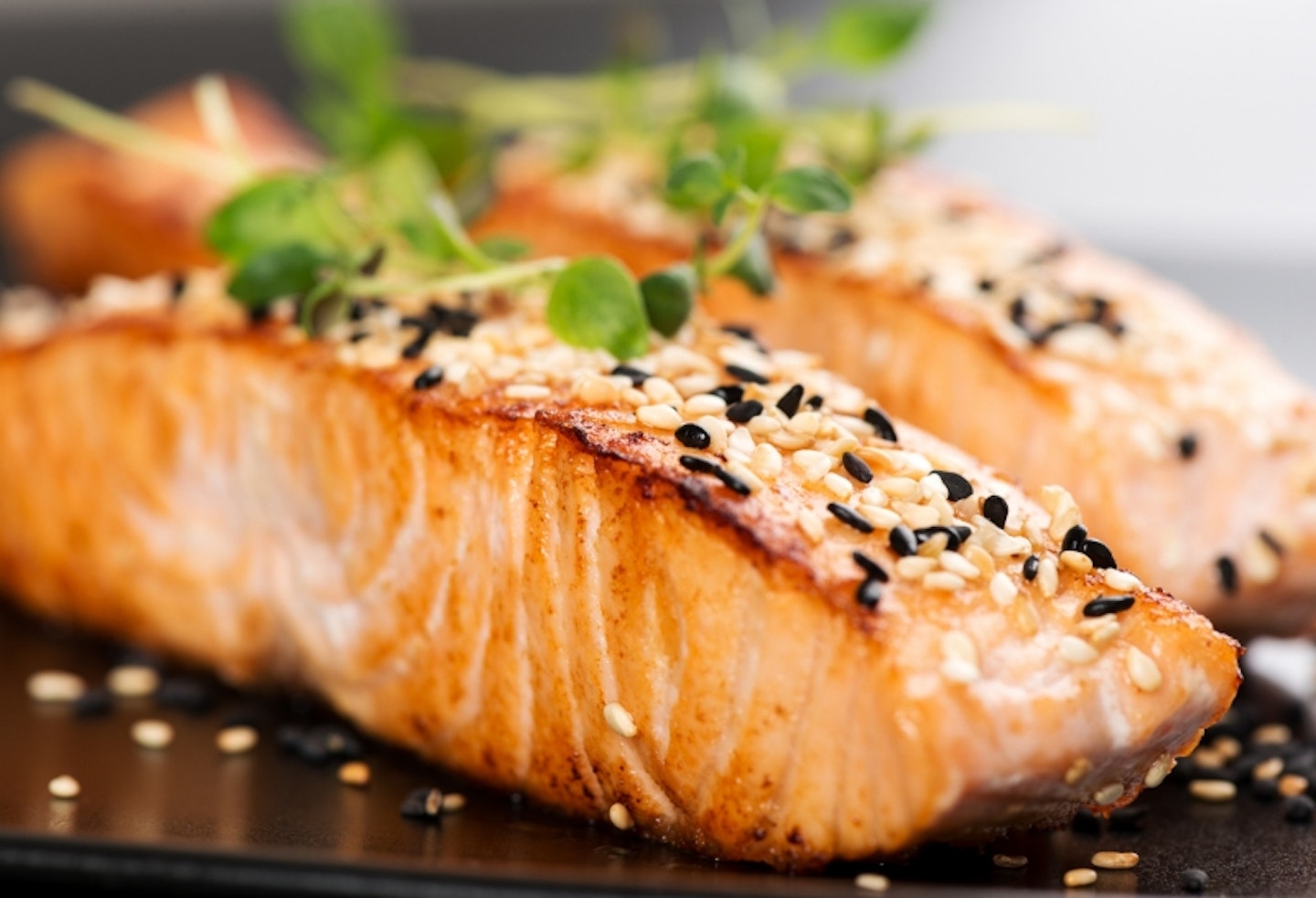 12 of 18
12 of 1812) Oily fish
Oily fish like salmon or mackerel are great because they contain Omega 3 fatty acids which are really beneficial during pregnancy.
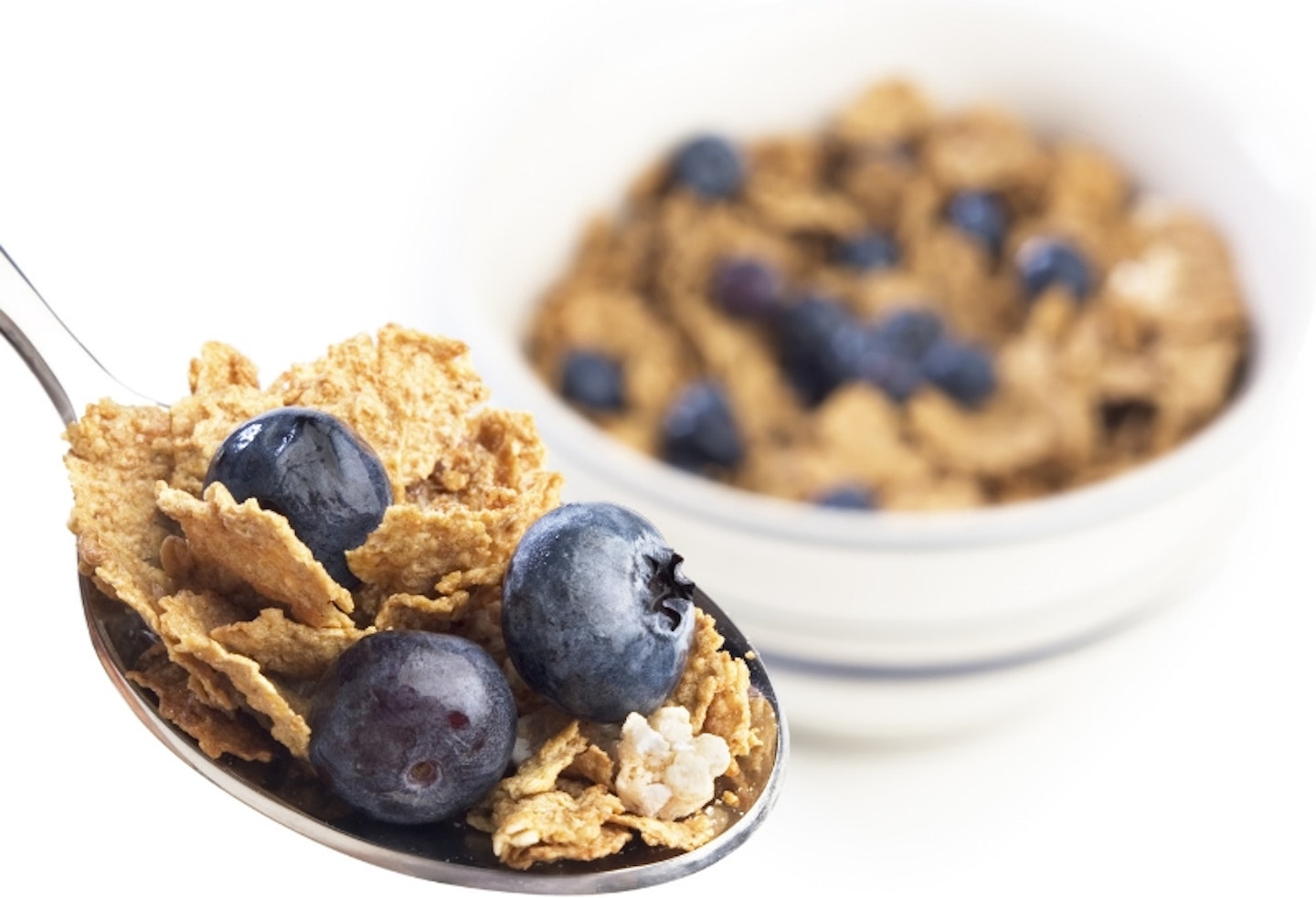 13 of 18
13 of 1813) Fortified cereals
Cereal is not the healthiest option compared to the other food items on this list as it can be full of sugar. However, if you can't stomach hot food, particularly smelly food or vegetables then cereals fortified with vitamins are an easy option to ensure you're getting the vitamins you need.
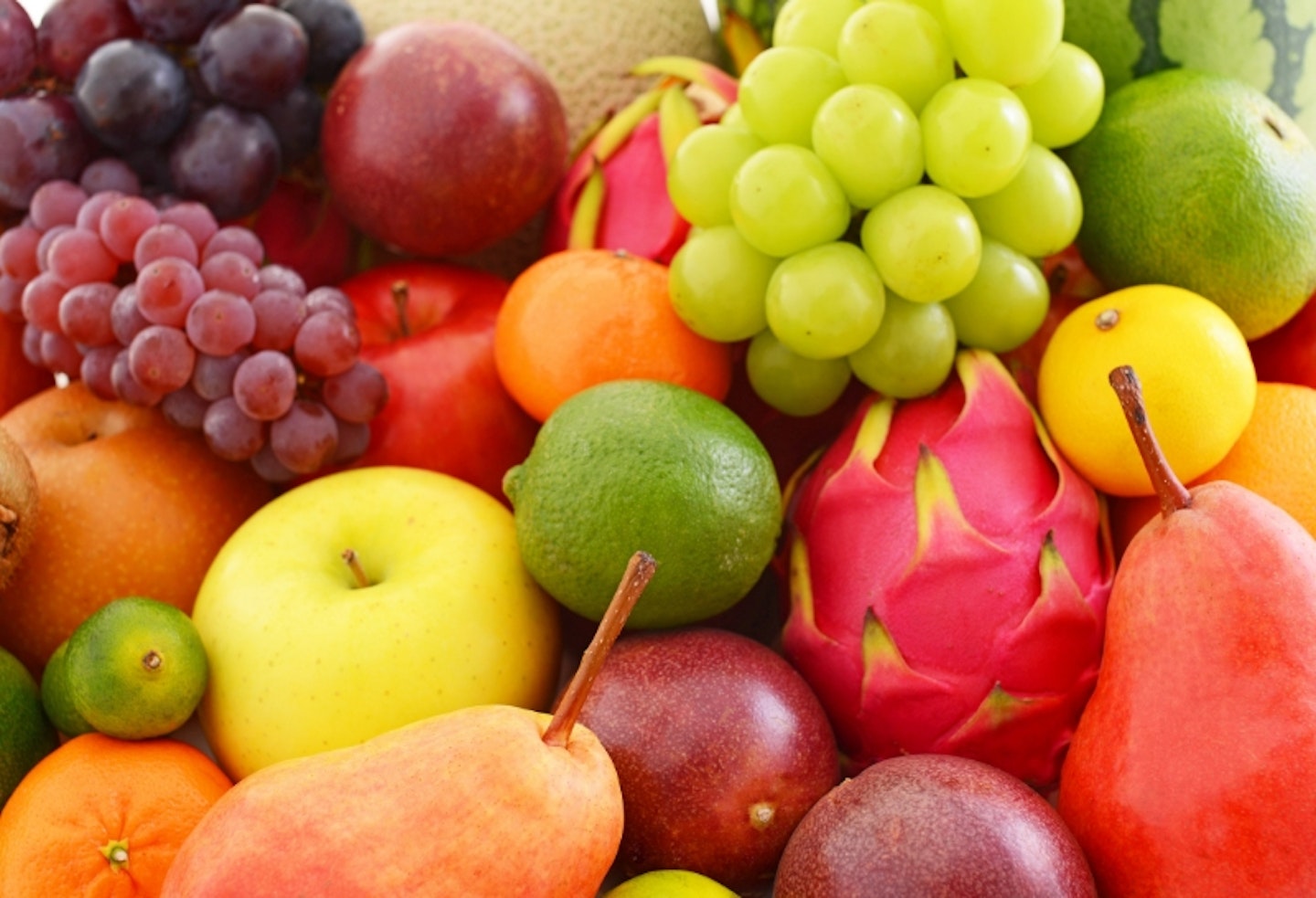 14 of 18
14 of 1814) Fresh fruit
Snacking on fresh fruit if you can't face big meals is a good option. Fruit is naturally low in fat and does not contain cholesterol. Fruit contains B vitamins, folic acid and dietary fibre. It always better to get your allowance of fruit and vegetables in real food instead of sugary juices.
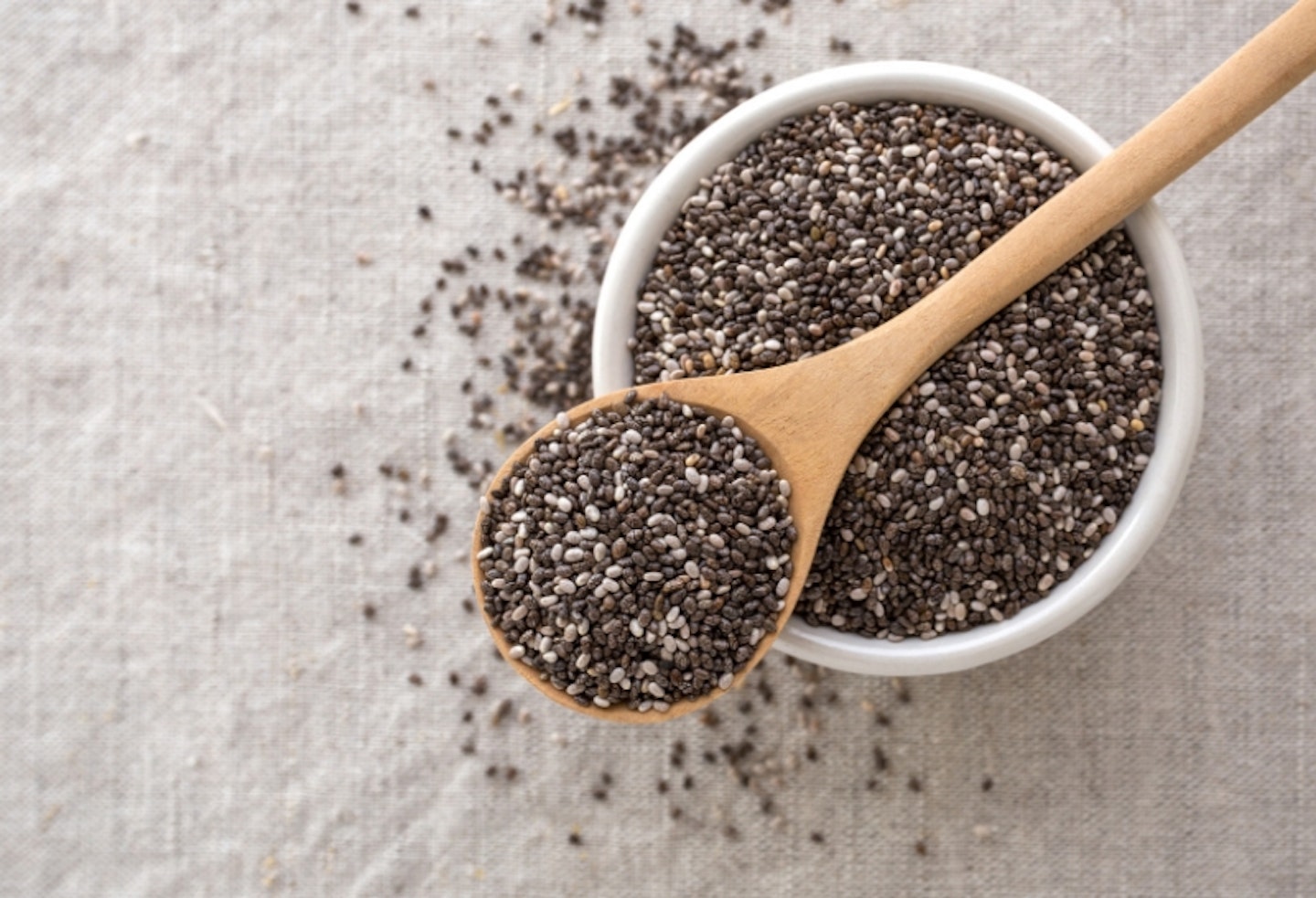 15 of 18
15 of 1815) Chia seeds
Chia seeds are a really great superfood during prengnacy. According to Live Strong "Two tablespoons of these little chia seeds pack a big nutritional punch, providing 138 calories, about 8.5 grams of fat (primarily omega-3 fatty acids), 4.5 grams of protein, 11 grams of carbohydrates and 9 grams of fiber. Chia seeds are also a good source of calcium, iron and vitamin A. One serving of chia seeds provides a pregnant woman with over 15 percent of her protein needs, over a third of her daily fiber needs and nearly all of her additional calorie needs for the first trimester."
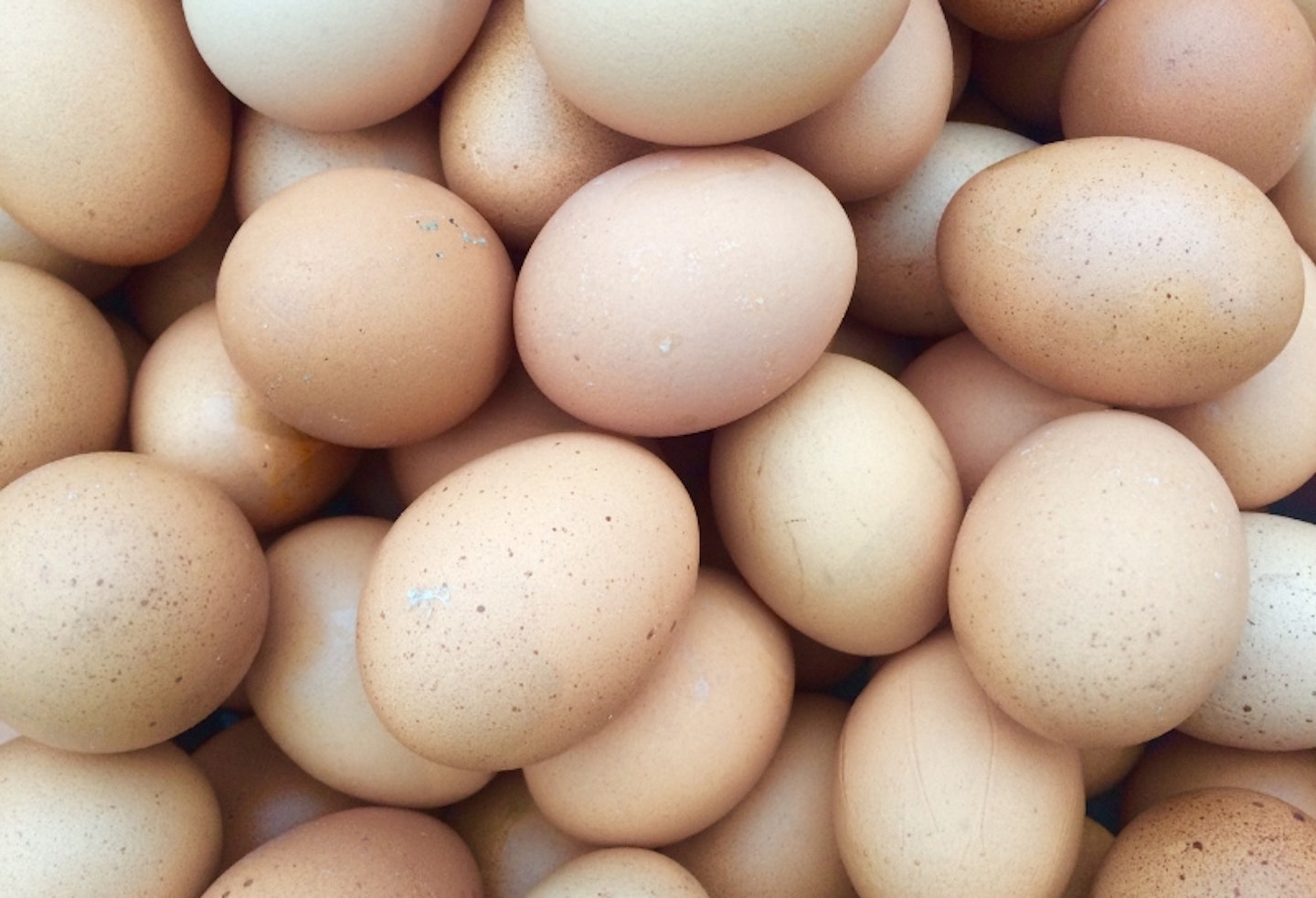 16 of 18
16 of 1816) Eggs
When you're pregnant, eggs are probably a love or hate it food because of their strong smell. However, some pregnant women find it helps them with nausea and they are a great filling start to their day. They contain a lot of protein, choline and vitamin B12.
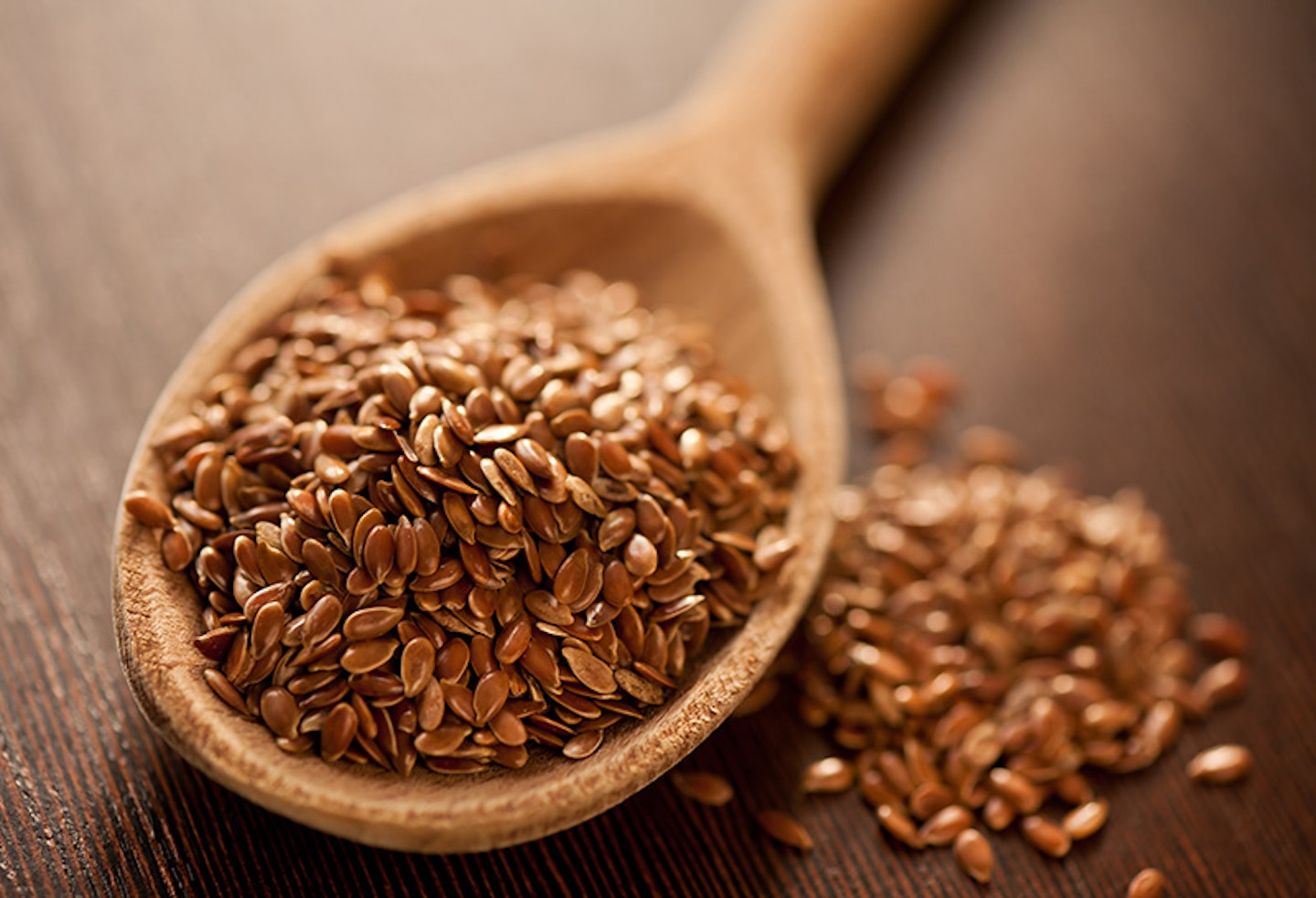 17 of 18
17 of 1817) Linseeds
Linseeds contain vitamin B12 and they are a great extra to add to yoghurt, porridge or cereal to fill you up and give you an extra boost of nutrients.
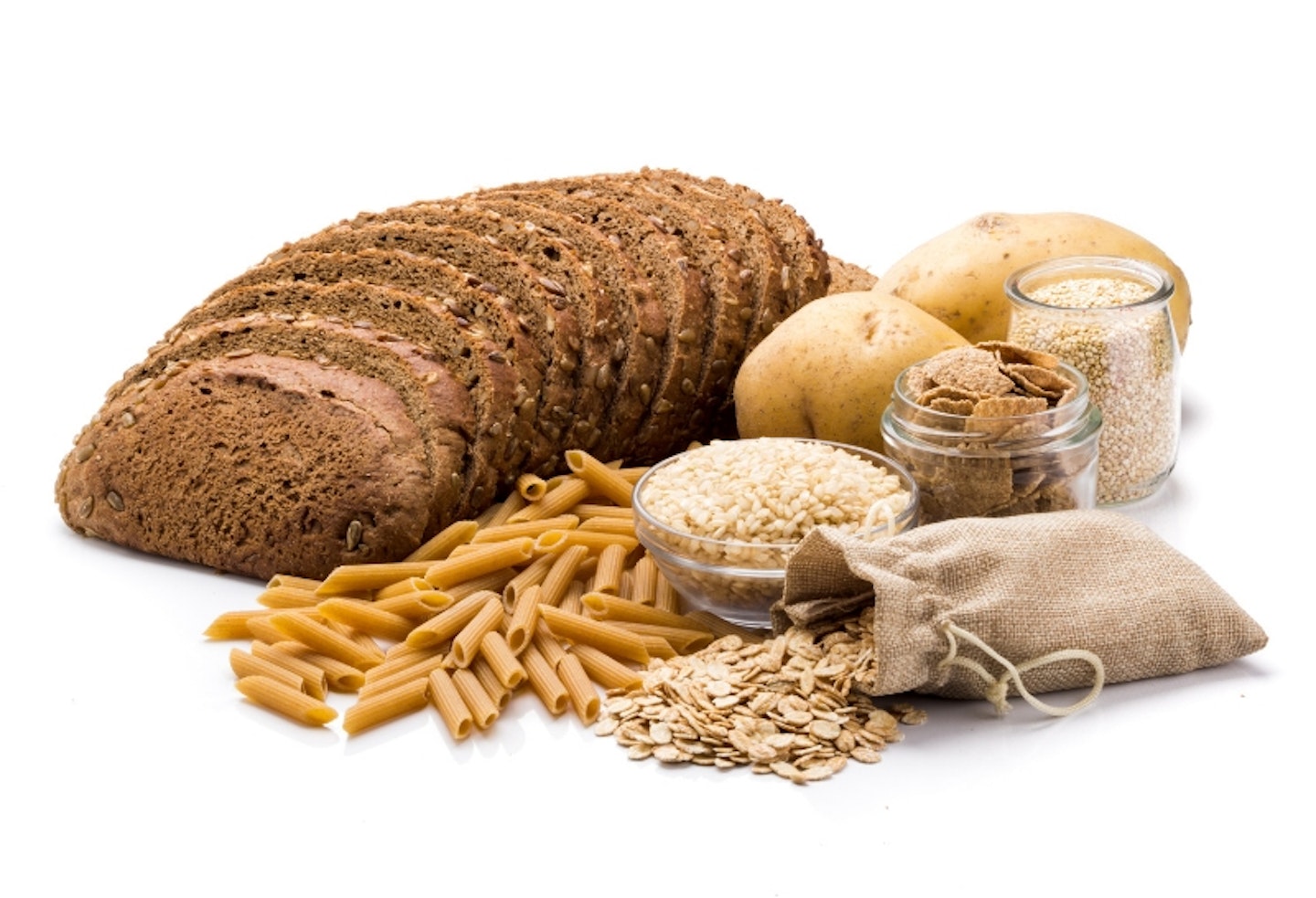 18 of 18
18 of 1818) Carbohydrates
Carbohydrates such as bread, pasta and rice are great during pregnancy as they are relatively bland and inoffensive. They fill you up quickly and everyone loves a beige food. It is best to eat frequent high carb meals that are low in fat. However, if you struggle with indigestion and bloating, it might be a good idea to limit your consumption of them as they are a common culprit.
Stage 3: Weeks 13 - 28
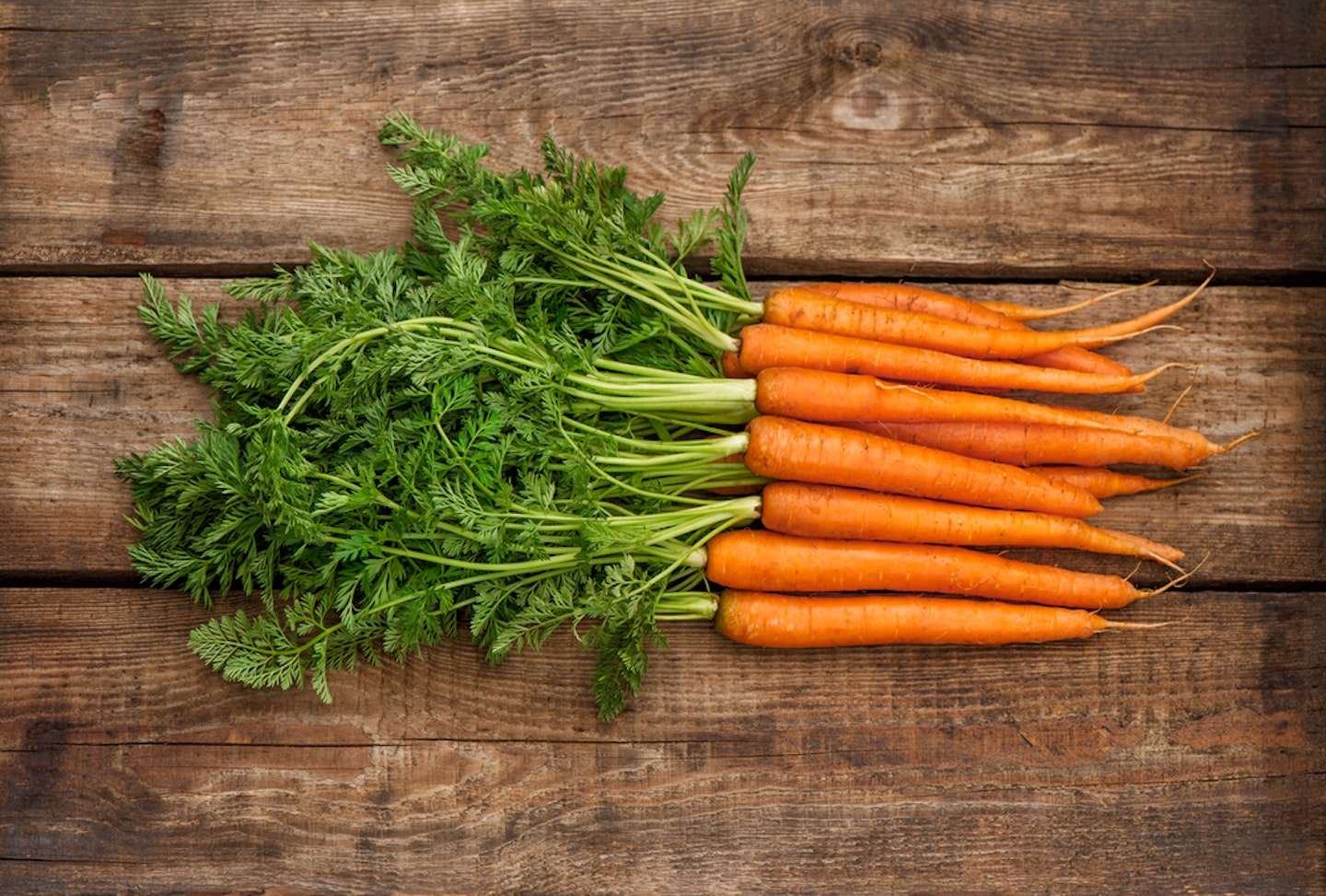
As you move towards week 15, start including carrots and other orange foods, such as sweet potato, into your diet as they are rich in betacarotene. ‘Your baby’s eyes are starting to develop their functional components now, and betacarotene benefits eye health,’ says Saidee.
If you’re craving dairy, go for it, as this is a perfect time to boost your calcium reserves to strengthen your baby’s bones. You can get it from{href='' }milk, yoghurt and hard cheeses, as well as tofu and sardines with the bones in.
Vitamin Dhelps you absorb calcium but, if a dose of sunshine is wishful thinking right now, fill up on mushrooms as they contain a decent dose. Zinc is another must-have at this stage. ‘It’s needed for the production, repair and functioning of DNA, so is essential in pregnancy – a time of rapid cell growth,’ says Saidee. It also helps ward off colds, a bonus at a time when your immune system is lowered and you’re more vulnerable to picking up every bug going.
And keep taking your DHA. ‘A study found that children of women who took DHA supplements during week 18 did better in cognitive tests at the age of four,’ says Saidee.
Stage 4: Weeks 29 - 40
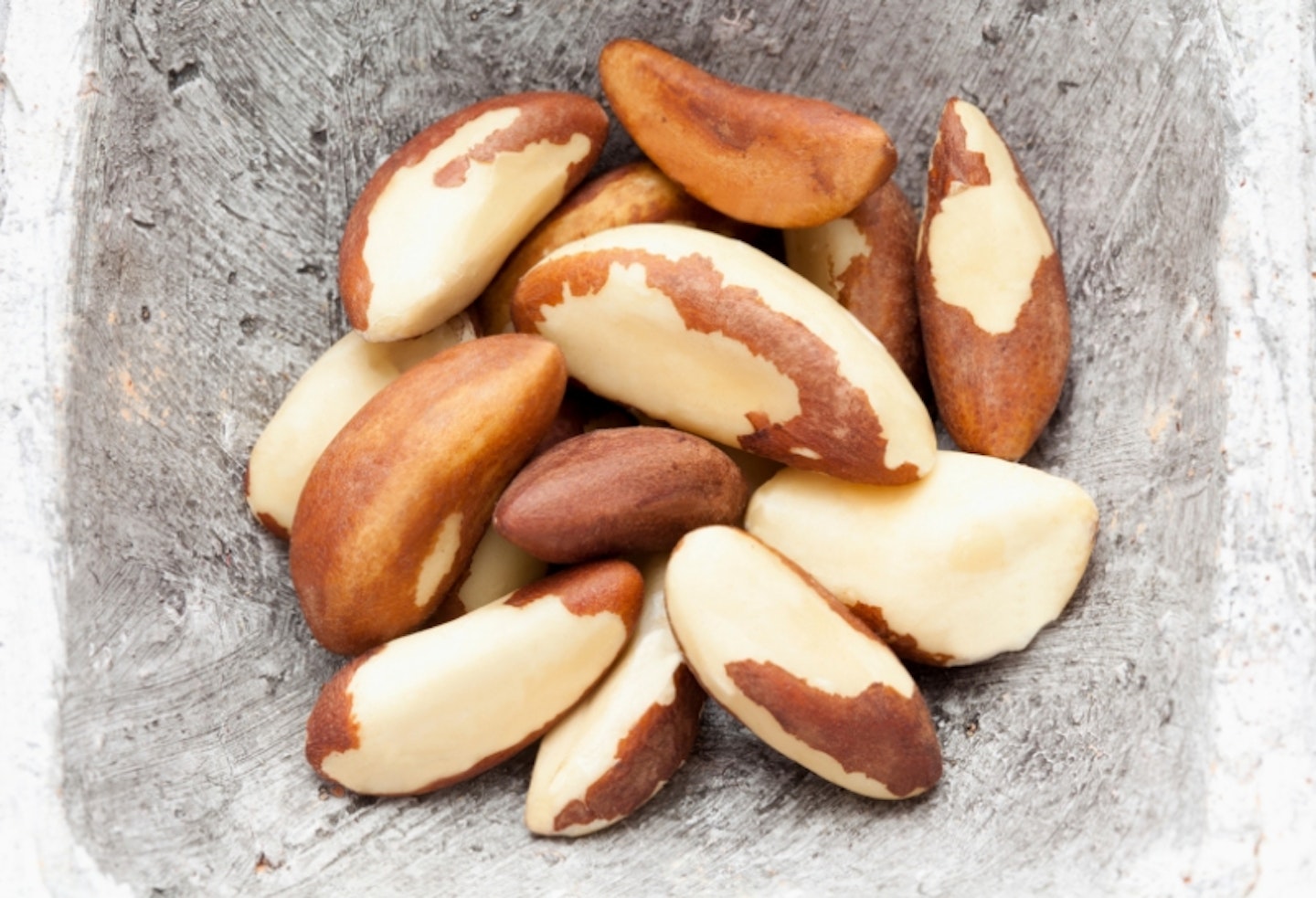
‘As you hit 30 weeks, add a side serving of kale, spinach or Swiss chard to meals, as they’re full of vitamin K,’ says Saidee. ‘This will help your baby’s blood to clot.’
Drink lots of milk, too, as he is still storing up his reserves of calcium and magnesium.
Drink lots of milk, as your baby is storing up his reserves of calcium and magnesium
By week 38, your baby is fully formed and only his lungs are still developing. Eat Brazil nuts to up your selenium levels, a mineral associated with healthy lung capacity. It’s also time to think about yourself. ‘You wouldn’t run a marathon without making sure you’re on form – the same goes for preparing for birth,’ says midwife Clemmie Hooper. ‘Plus, the stronger your immune system, the more immunity you pass to your baby.’ So, get stuck into wholegrains, fish and antioxidants – tomatoes, cranberries and artichokes are all good sources.
Stage 5: Post-Birth
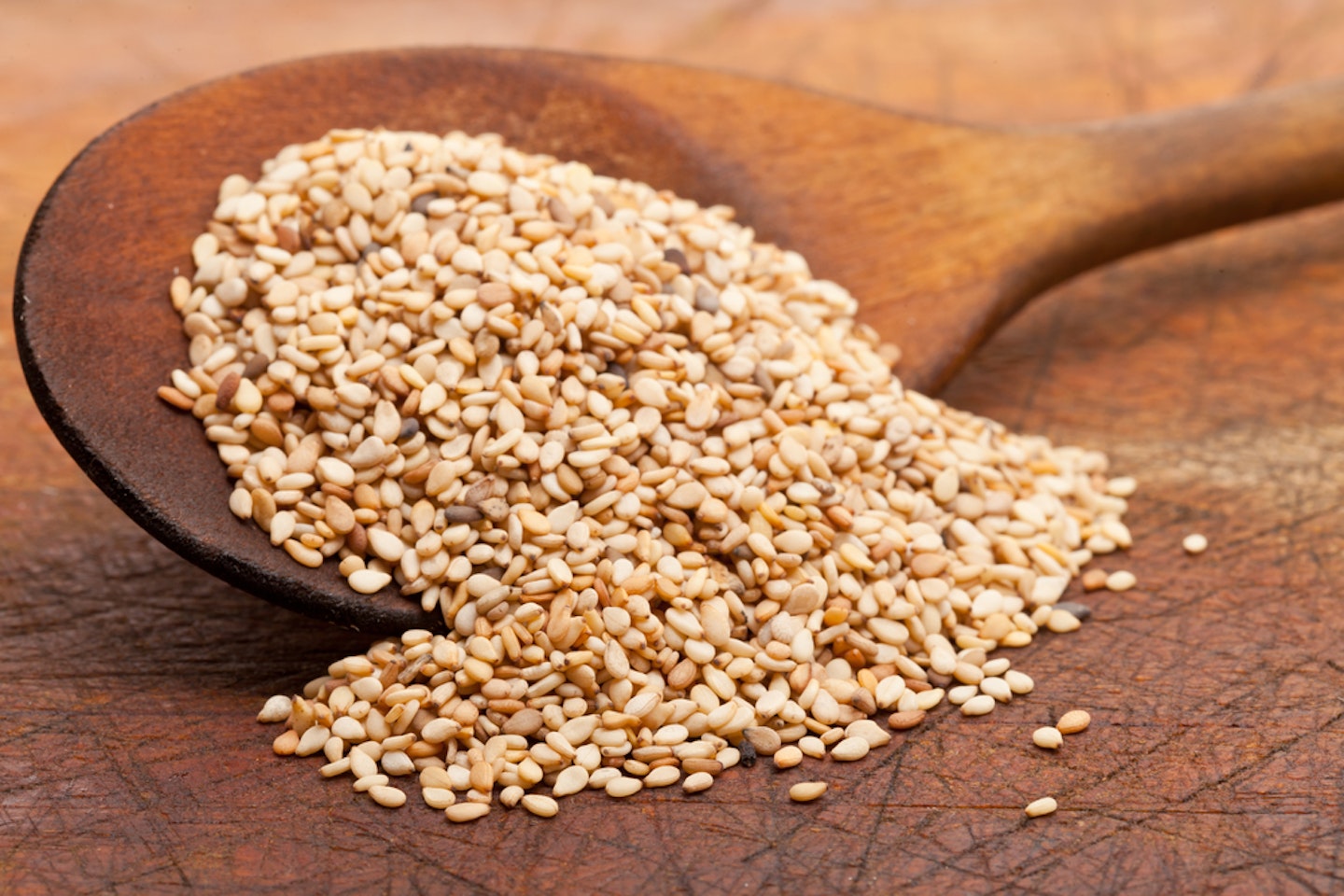
Woo-hoo! You did it and your baby is here. Now it’s time to get your strength back after labour and gear up for regular breastfeeding.
Post-childbirth, your body will benefit from copper. This mineral helps reduce inflammation, soreness and aches after labour. The richest source is sesame seeds, so sprinkle them on everything for the next few weeks.
As your baby’s eyes continue to develop for up to six months after birth, keep tucking into the squash and{href='' }pumpkin, as the betacarotene will come through in your milk. Throw in some red bell peppers, too. They contain bioflavonoids, which can reduce the risk of infection around your baby’s umbilical cord.
And make sure you’re eating enough. Women need around 300 extra calories a day in the first few months of breastfeeding. While you shouldn’t eat biscuits all day, you can treat yourself.
